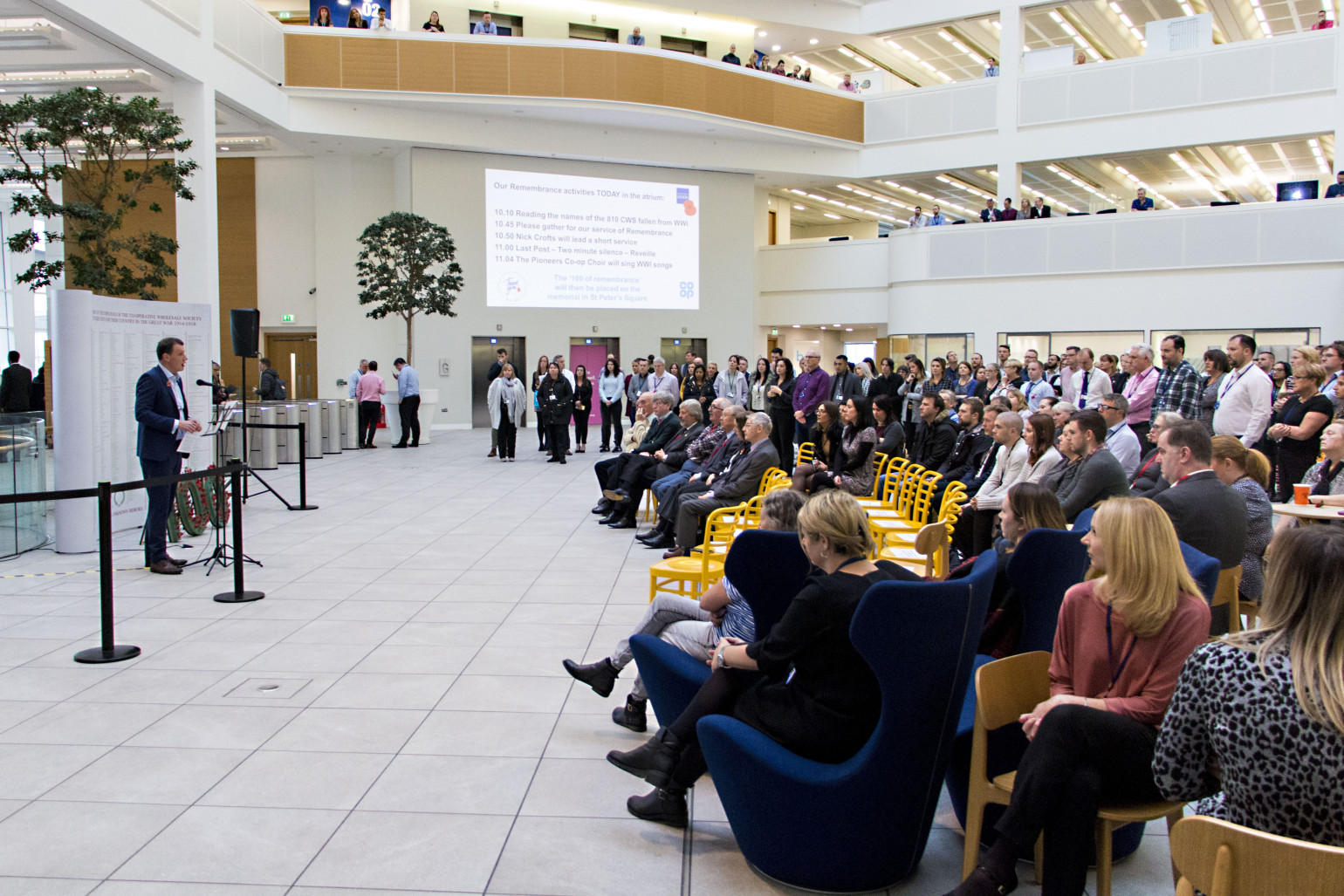On 8 November the Co-op Group hosted a ceremony at its support centre in Manchester to commemorate staff fallen during World War I
As part of the ceremony, current employees read out the 810 names of the Co-operative Wholesale Society colleagues who were killed in the conflict.
In a post on the Co-op Group’s blog, chief executive Steve Murrells looked at the impact of the conflict on the society, as well as the efforts made by the business to help members and employees.
He wrote: “In 1914, the Co-operative Wholesale Society (CWS), as we were then known, employed thousands of people in Manchester and across the country at our head offices, factories and depots. In those days we were a major manufacturer of everything from biscuits to boots.
“By mid-August of 1914 350 CWS employees had already enlisted. We promised to hold their jobs open for them until their return and to pay to their dependents the difference in soldiers’ wages while the war lasted. By 1918, with 6,000 CWS employees in uniform, it amounted to a commitment worth more than half a million pounds, a vast sum of money in those days and equivalent to around £35m in today’s money.
“By September 1914 CWS had won the contract from the War Office to manufacture 200,000 tunics, trousers, caps and 63,000 blankets. We provided all of this to the government at cost.”
Mr Murrells said that while some millers at the time chose to end all contracts, predicting an upsurge in price due to supply and demand, the CWS honoured all of its existing agreements and sold more than a million sacks of flour in the first six months at less than market prices.

“We had no intention of making profits from the war, either through clothing or food,” he added.
The CWS had lost more than 800 colleagues by the end of the conflict, with others injured and mentally scarred.
One of them was private Charles Jeeves who served in D. Company, 1st Northamptons, who was an employee at the CWS boot factory at Rushden. After getting wounded on 9 May 1915, he wrote an account to his old boss at the CWS, recalling what had happened to him.
Related: 100 years on, we look at how Co-op News covered World War I
“Hundreds of our men were lying around me, either killed or wounded, and they were firing on those that lay there to make sure of finishing them off. I laid through this for fifteen hours, during which time our people bombarded again, and another regiment attempted to take the same trenches and lost, if possible, heavier than we.
“They were sending over shells during the whole of the time I was laying there, and they were bursting all around me, and I could hear the wounded shout as they were continually being hit, and I expected to be struck again at any minute, but was one of the fortunate,” he wrote in a letter that can be read on the Co-op Group’s website.
To pay tribute to those who had lost their lives, in 1930 the CWS built a memorial in one of its new office buildings on Corporation Street in Manchester. Many other CWS premises around the country built their own memorials in the years following the end of the war.
In his blog post, Mr Murrells also mentions the role of the CWS and its female members and employees in promoting peaceful reconciliation to conflicts.
“The wearing of white poppies was first launched by the Co-op Women’s Guild in 1933 before being taken up by the Peace Pledge Union. The white poppy remembers not only the military casualties of war but the civilians, too.”
Related: White poppies tell the story of the alternative Remembrance Day
On Remembrance Sunday Co-op Group food stores will join the two minutes of silence. A number of Co-op Group Funeral homes as well as those of independent co-operative societies have created window displays honouring the war generation, and Co-op Funeralcare has introduced a poppy-themed hearse to it fleet.
“By reaching back across a century, we’ve reminded ourselves that when it’s mattered most, we’ve been in tune with the greatest concerns of our members, colleagues and our customers. We must continue to be a business that thinks and acts like this as we face the challenges of the decades to come.
“As the ‘war to end all wars’ finally retreats from living memory, we remember with pride our colleagues who lost their lives, or whose lives were changed forever, by the conflict. And we take inspiration from the decisions we took a century ago that demonstrated our community minded thinking and our commitment to business integrity,” added Mr Murrells.

